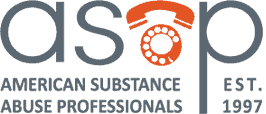ASAP COVID-19 Statement
On behalf of ASAP, our hearts are with everyone impacted by the COVID-19 pandemic. Our priority at ASAP is protecting public safety along with the health and wellbeing of our clients, SAPs and employees. We recognize that trucking and other transport are more vital than ever to the health, well-being and safety of the United States. ASAP will remain fully operational during this crisis.
ASAP business hours will not change and we are available Monday through Friday from 8am to 6pm EST. We will be available to support continuity in the workforce needed to move vital supplies within the United States. We remain committed to providing every person with the highest level of service and safety. We will continue to keep everyone informed with any updates related to policies and operations during this time. Please be safe and stay healthy.
Statement of Enforcement Discretion for Substance Abuse Professionals
The U.S. Department of Transportation Office of Drug & Alcohol Policy and Control (ODAPC) has issued a Statement of Enforcement Discretion for Substance Abuse Professionals (SAPs) with regard to face-to-face SAP assessments and evaluations as outlined in 49 CFR §40.291, §40.293, §40.307 and re-qualification timelines outlined in 49 CFR §40.281(d).
Recognizing that face-to face assessment and evaluation during the COVID-19 public health emergency presents significant issues, this guidance states that SAPs are allowed to provide remote services for assessments and evaluations as long as the Department of Health and Human Services (HHS) determines there is a public health emergency or December 31, 2020, whichever is sooner. On December 9, 2020, ODAPC extended the statement and it continues to be in effect through June 20, 2022.
ODAPC published the following guidance regarding remote evaluations:
- The technology you use should permit a real-time two-way audio and visual communication and interaction between you and the employee.
- You should determine if the quality of the technology (e.g., speed of the internet connection, clarity of the display, application being used, etc.) is sufficient for you to gather all the visual (e.g., non-verbal physical cues) and audible information you would normally observe in an in-person face-to-face interaction.
- You may only utilize the technology if your state-issued license authorizes you to do so and within the parameters of that authority.
Additionally, the format of the initial assessments, evaluations and follow-up evaluations be documented in the final report for reference. During this national health emergency, there is a critical need to keep our supply chain and logistics operational. The use of remote services will allow SAPs to continue to do their part in supporting our transportation workers and protecting public safety.
With regard to re-certification timelines, the guidance states that should service agents such as SAPs be unable to meet re-qualification timelines during the public health emergency because of lack of access to needed resources, The Department will not consider it non-compliance for the purposes of starting a public interest exclusion.
Visit ASAP LearnOnline for CEU course information.
ASAP is here to support each of you through this challenging time. We are happy to provide resources and answer questions. We will continue to provide updated information on regulatory guidance as it becomes available. Please contact our office if you are a SAP and able to conduct tele-conferencing evaluations, need guidance on tele-conferencing capabilities or have any questions at 888.792.2727 x604. Employers and Partners with questions, please call 888.792.2727 x607.

